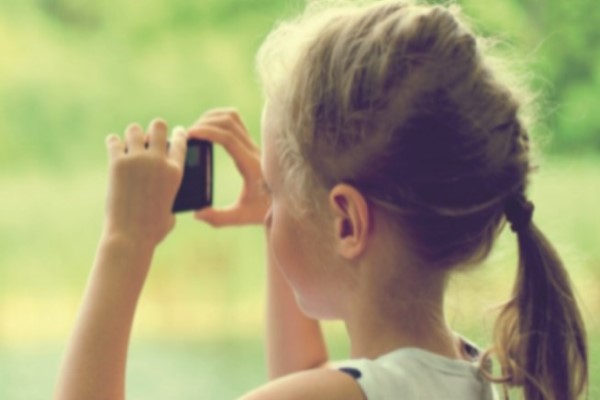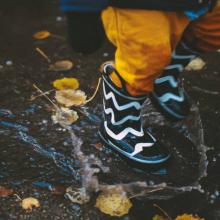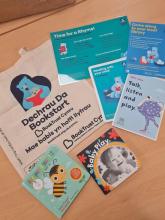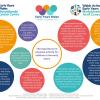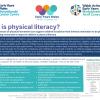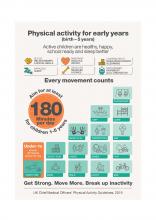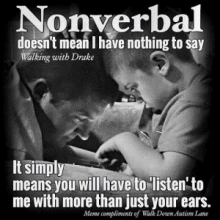This is where her story with childcare began. While trying to organise a birthday party for her daughter, Mary, Belle realised she had no young friends to invite to her daughter’s party. There was no space for her daughter at nursery and no support available. With that, Belle created a group with other mums in a similar situation and started to look for places where they could meet regularly. A nursery nurse, who worked at Belle’s son’s school, offered to work with them and soon after, they found a space in a local church hall in Marylebone. It all started with six children attending the group for two hours a day.
Belle wrote a letter to The Guardian in 1961 called “Do-It-Yourself Nurseries” asking the government to provide more childcare places for children under five and suggesting that parents should set up their own groups to help with the childcare shortage.
Within the first year Belle organised the first Annual General Meeting with 150 members, after having a huge response to her letter. Two years later, the association became recognised as a charity and had over 1,300 members. They opened their first office in Toynbee Hall in London.
It is a testament to her vision, that the founding principles of socialisation for children and their parents, play-based experiences and provision available to all are now well-researched principles of early childcare and learning. And, whilst childcare might have developed enormously since that time, organisations born from the PPA movement, such as Early Years Wales, are still integral in supporting Government and influencing policy to ensure that children and families get the support and childcare they need.
“The fact that 60 years on organisations like Early Years Wales and the Early Years Alliance are supporting members with training, resources and ideas to support their practice demonstrates that Belle’s vision was very much needed in the UK. Maybe, after the 18 months we’ve all lived, re-focusing on the children in those vitally important early years; the family and carers; and reconnecting social networks are priorities we can all continue to strive towards; recognising the benefits for children of high-quality early education and care to provide every child with the best possible start. Here’s 60 reasons why early years makes a difference!” (Dave Goodger, CEO, Early Years Wales)
In no particular order, we asked the Early Years Wales team to list as many amazing things about the early years as they could think of. Some we have elaborated on, others we have left to your own imagination…
The list was endless but fittingly here are 60 to get you started!
Organisations like ours were set up to enhance the development and education of pre-school children across the UK by supporting childcare providers with the means required to support their practice. We’d like to take this opportunity to celebrate our colleagues across Wales; Clybiau Plant Cymru Kids Clubs, Mudiad Meithrin, NDNA Cymru, and Pacey Cymru. Not forgetting our 5-Nations colleagues across the UK; Early Years Alliance (England), Early Years Scotland, Early Years (Northern Ireland), and Early Childhood Ireland
2. Being curious
3. Childhood development depends on the interaction between genes and environmental variables. For example, a child may have the genes to grow tall, but if it doesn’t have the proper nutrition, it may never achieve full height.
4. Welsh Government Healthy & Sustainable Pre-school scheme – keep an eye out for the autumn 2021 issue of smalltalk for more info.
5. smalltalk magazine…supporting the early years sector in Wales for over 30-years
Published quarterly since spring 1986 and mailed free of charge to all Early Years Wales members. smalltalk is the must-read title for early years education and early years childcare providers in Wales.
Whether you are looking for ideas to implement within the setting or to help you with your training and development, wanting to keep up to date with the latest curriculum changes or changes in legislation, or simply looking to improve your knowledge and skills, our 32- page, full colour magazine is packed full of articles to inspire you to embed and inform high-quality practice, whilst continuing to run a successful business.
The magazine has seen various changes over the past 18 months. When the Covid-19 pandemic hit, publication was scaled down to online-only, which enabled us to offer it bilingually for the first time. The summer 2021 issue increased in size from 28-pages to 32-pages and we are proud to announce that from the autumn 2021 issue we will be cranking up the printing press again and mailing out a 64-page bilingual magazine to all members.
DID YOU KNOW? You can download every issue published since winter 2012.
6. The development of language occurs in four stages:
- babbling stage,
- single-word stage,
- two-word stage,
- multi-word stage
7. Bilingual advantage
The bilingual advantage is so-called because a child who speaks two or more languages develops better cognitive functions. The brain of a bilingual child manages the use of two (or more) languages with ease and this has a direct effect on the development of the brain’s executive functions, such as problem-solving, mental flexibility, inhibition, and control of attention (ref: https://thebilingualadvantage.com/)
You may also be interested in:
Quality for All Sharing Quality Practice Part 3: Play and Development, smalltalk, (spring 2021), pg 18 – 20
Download your copy here: https://www.earlyyears.wales/en/product/smalltalk-spring-2021-0
8. At birth the brain is not fully formed and in the first 3 years trillions of new connections are made
9. Parents learn too - parents learn to understand their child's needs and follow their prompts. They learn about child development, language development, physical development etc
A partnership between Early Years Wales and Welsh Gymnastics delivering the Welsh Active Early Years programme to 0-5-year-olds across Wales, as part of the Healthy and Active Fund – a partnership between Welsh Government, Sport Wales, and Public Health Wales
SEE ALSO:
- https://www.earlyyears.wales/en/active-together-wales
- https://www.earlyyears.wales/en/active-baby-and-you
- https://www.earlyyears.wales/en/active-baby-home
11. Up to 30 hours FREE childcare for 3 and 4-year-olds
‘The childcare offer for Wales’ provides working parents with a mixture of childcare and early education for children aged 3 or 4.
Early education is also known as ‘Foundation Phase nursery’. It is mainly provided by schools where children learn through play.
Childcare includes:
- nurseries
- child minders
- playgroups
- crèche
- out of school child care
- nannies
You can choose your own childcare provider that meets your child’s needs.'
Visit: https://gov.wales/childcare-3-and-4-year-olds for more info
12. The Foundation Phase
The Foundation Phase is the statutory curriculum for all three to seven year olds in Wales, having been introduced in September 2010. It encourages children to be creative and imaginative and makes learning more enjoyable and more effective. (Ref: https://hwb.gov.wales/storage/d5d8e39c-b534-40cb-a3f5-7e2e126d8077/foundation-phase-framework.pdf)
SEE ALSO: https://www.earlyyears.wales/en/foundation-phase
DID YOU KNOW: that every issue of smalltalk magazine has a Foundation Phase: Talking Point feature? Below are a sample of a couple of articles we have published in previous issues for you to read...
- Children's Photography- Capture the moment (smalltalk, autumn 2019)
- Creative practitioners nurture creative learners (smalltalk, winter 2019)
13. A child’s right to play
Article 31 of the United Nations Convention on the Rights of the Child says:
Every child has the right to rest and leisure, to engage in play and recreational activities appropriate to the age of the child and to participate freely in cultural life and the arts.
The Welsh Government upholds children's right to play in its Play Policy. This is much more detailed than the UN Convention, providing definitions, and emphasising the need for the provision of play environments that compensate for the loss of spaces and opportunities to play that children and young people experience in today's world. (ref: https://www.playwales.org.uk/eng/rightoplay)
14. Play Wales
Play Wales is the national charity for children’s play
15. The first five—and especially the first three years—of a child’s life are the most important. They shape the brain’s organization, development, and functioning throughout life
16. Communication - even before they can speak, babies can communicate by looking, smiling, crying, pushing things over, shaking things that rattle
17. Young children see detail and beauty, in that adults don't have time to notice
18. Cwlwm
Cwlwm brings together the five leading childcare organisations in Wales to deliver a bilingual integrated service that will ensure the best possible outcomes for children and families across Wales.
Cwlwm organisations are Early Years Wales, Clybiau Plant Cymru Kids Clubs, Mudiad Meithrin, NDNA Cymru and Pacey Cymru.
Designed to Smile is a national programme to improve the oral health of children in Wales. It is funded by the Welsh Government and was launched in 2009. All of the Designed to Smile services and all NHS dental treatments for children are FREE – visit the website to sign to the nursery and school-based toothbrushing programme for children to help protect young teeth against decay. https://phw.nhs.wales/services-and-teams/designed-to-smile/
20. Children are motivated to talk through stimulating experiences and Early Years practitioners create a relaxed, supportive environment in which children feel safe and valued
21. When children are young, their social skills are constantly evolving; when they play in a group they learn to negotiate plans with their friends, extend and elaborate ideas and to co-operate, share and take turns.
22. The wonder in a puddle! There is nothing like the wonder displayed by early years children when they splash in puddles
23. Learning to regulate own emotions - from temper tantrums over the slightest thing to great joy.
24. It’s an exciting educational journey /experience
Nursery rhymes and music
25. Not only are singing songs and rhymes good for our children’s mental health and mood, but research has shown that singing can actually help build your immune system. Did you know that singing is also an aerobic activity? It forces us to breathe deeply, which draws more oxygen into our bodies. This then travels all around our bloodstreams and even oxygenates our brains.
26. Song is a special type of speech. Lullabies, songs, and rhymes of every culture carry the 'signature' melodies and inflections of a mother tongue, preparing a child's ear, voice, and brain for language.
27. Listening to and singing along with rhymes and songs uses and develops both sides of the brain.
28. Have fun…babies and young children love songs and rhymes. They don’t care whether you can sing or not, they just love to hear the sound of your voice. Booktrust Cymru have got a fantastic range of illustrated audio rhyme sheets, in English and Welsh, which you can download https://www.booktrust.org.uk/what-we-do/programmes-and-campaigns/bookstart/families/bookstart-in-wales/have-fun-sharing-rhymes/
29. Children relish in listening to songs full of rhyming, rhythm and repetition. By singing songs containing these core elements it is helping boost children’s language, communications and literacy development.
The benefits of reading together
30. Sharing books and stories can help children understand the world around them and develop key social and emotional skills.
31. Just ten minutes shared reading a day can help your child grow into a happy, confident learner.
32. Reading to children even before they can understand teaches them to associate books with love and affection
33. At birth, the average baby's brain is about a quarter of the size of the average adult brain. Incredibly, it doubles in size in the first year. It keeps growing to about 80% of adult size by age 3 and 90% – nearly full grown – by age 5.
34. If we could all see the world through the eyes of child, we would see the magic in everything!
35. Early years practitioners have an amazing opportunity to help babies and young children develop their speech and language skills and the first three years of life are recognised as the most intensive period for acquiring speech and language skills so fill those years with fun experiences of sound and language.
36. Learning through play Play is one of the main ways in which children learn. It is essential for the growth in children’s cognitive; physical; social and emotional development. The Foundation Phase is built on the principles of learning through play and is an essential ingredient in the curriculum. (Ref: https://gov.wales/sites/default/files/publications/2018-06/how-is-my-child-doing-in-the-foundation-phase-a-guide-for-parents-and-carers.pdf)
37. The Importance of Physical Activity
Early Years Wales and Welsh Active Early Years partnered to develop a series of bilingual activity cards for a selection of sports taking place at the Tokyo Olympic Games 2020. The activities are geared at pre-school children to develop the fundamental skills needed for health and well-being and are a perfect resource pack to use with children.
Download the Early Years Wales Olympic Challenge 2021 activity pack here: https://www.earlyyears.wales/en/shop
For a sample of the pack click the image below
38. What is physical literacy?
Physical literacy is the motivation, confidence, physical competence, knowledge, and understanding that provides children with the foundation for lifelong participation in physical activity.
Download the Early Years Wales Olympic Challenge 2021, What is Physical Literacy Card by clicking on the image below
SEE ALSO: https://www.sport.wales/content-vault/physical-literacy/
The Active Baby & You training programme developed by Welsh Active Early Years is aimed at childcare, play and gymnastic practitioners, who can share the health and well-being messages to the families in their care, enabling them to provide an understanding of the importance of physical literacy in the early years through the delivery of a 4-week multi-skills play-based approach.
You may also be interested in: https://www.sport.wales/content-vault/play-to-learn-resources/
39. Making their own choices
40. Forming friendships
41. Develop resilience and an ability to cope with challenges
42. Attachments - from attachments with parents or primary carers to forming attachments with other family members, friends and childcare providers
43. It is a time of rapid growth both physically and in learning and understanding
44. Play - the early years are a time for uninhibited play as a means of children understanding their world, how things work, sharing, cause and effect, problem-solving, planning and above all having fun.
45. At no other point will children learn so many physical skills as they do in the first five years of life!
46. As Albert Einstein once said: “Play is the highest form of research.” In our child's eyes, the playground is more than just metal and plastic pieces. It is where they can turn on their imagination and be whatever they want to be.
47. Early playing is found to be associated with higher intelligence later in life
48. Children are born with a sense of wonder and an affinity for nature. They are naturally curious and. interested, with a great imagination and a special ability to see beauty and good all.
49. Having fun is good for you because physiologically, it helps to balance out our stress and feel-good hormones, preventing diseases long-term. It helps to boost our creativity, energy, productivity, and overall cognition. ... Children are simply amazing with their sense of curiosity, creativity, and overall happiness.
50. Play is an excellent way to bond. Happy playful moments in children are some of the most precious gifts we can give our children
51. Have you heard the adage: “practice makes perfect?” In early childhood, repetition forms the basis for learning, skill development, and accomplishment. ... A child must first learn fundamental skills before they can acquire speed, increased confidence, and mastery. It is through repetition that possibility becomes ability.
53. Neuroscientists discovered that enrichment such as toys, games, and playing can alter a brain’s chemistry and physiology. The brain area associated with higher cognitive processing (the cerebral cortex) can benefit from environmental enrichment and play more than other parts of the brain
54. Qualifications empower people with opportunities for the future, they help people get into a job, get on in the job and go further. They drive up standards in Childcare in Wales and help to achieve ambition of empowering a bilingual nation. With the demand for qualified childcare workers at an all-time high, we look forward to bringing you the latest updates from WJEC / City & Guilds and Educ8 in the autumn 2021 issue of smalltalk
You may also be interested in:
- Delivering childcare qualifications in the face of Covid-19 (smalltalk, winter 2020)
- It's never too late to go back to school (smalltalk, summer 2020)
55. Additional Needs Referral Schemes - Early Years Wales understands the difficulties faced by a child who needs extra support to join in a childcare setting with other children. The Newport Additional Needs Referral Scheme can help if a family is struggling to understand thie child's behaviour, actions or needs, by helping to find a playgroup or nursery that can cater to their child's needs. If you live in Newport and would like more information you can download our helpful leaflet here
56. The Children (Abolition of Defence of Reasonable Punishment) (Wales) Act 2020 - The Welsh Government has led the way in promoting children's rights. The approach is based on a commitment to the principles of the United Nations Convention on the Rights of the Child (UNCRC) and now Wales is entering a historic period where it will see children's rights further protected thanks to new Welsh Government legislation and Welsh childcare organisations have played a key role in supporting parents ahead of the smacking ban. Find out more about the role your childcare organisation has played here
57. From birth through to early childhood, children use their senses to explore and try to make sense of the world around them. This leads to a child's ability to complete more complex learning tasks and supports cognitive growth, language development, gross motor skills, social interaction and problem-solving skills.
58. The importance of attunement - as adults it is important we are emotionally connected to children from birth, they - especially non-verbal children - need to feel they are understood in the moment.
59. Early Years Wales Awards
To commemorate our change of name from Wales Pre-school Providers Association (Wales PPA), in 2019 we launched the very first Early Years Wales Awards. The awards were designed to bring to the forefront the passion and dedication our members bring to the childcare sector in Wales. We believe our members lead the way in setting the standard for everyone within our industry. They are our members chance to be recognised and celebrated. Despite the impact of the pandemic the 2020 Awards were postponed, but we did manage to hold a virtual event at Christmas, we thought everyone deserved to end the year on a high and be celebrated for the incredible work they do for and with the children in our sector.
The Early Years Wales Awards 2021 are currently being planned and we hope to be opening registration shortly. Keep an eye on our social media channels for more details.
- Facebook: @EarlyYearsWales2018
- Twitter: @EarlyWales
- Instagram: early years wales
You may also be interested in: Little Inspirations Day Nurseries, Setting of the Year 2020 (smalltalk, spring 2021)
60. ...& to think it all started with a letter?!
In 2008, Wales PPA as Early Years Wales were formally known as, published Memories of the Playgroup Movement in Wales; 1961 – 1987. A collection of memories from former PPA members recording their experiences of the Playgroup Movement in Wales, from its inception in 1961, until its independence from England in 1987.
Sadly the book is now out of print, but we were able to locate the original file and have restored it for you to download and read at your leisure: https://www.earlyyears.wales/sites/www.earlyyears.wales/files/memories-of-the-playgroup_-002.pdf

